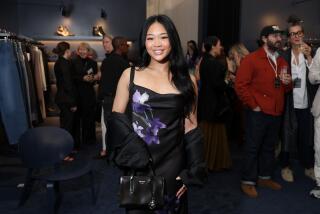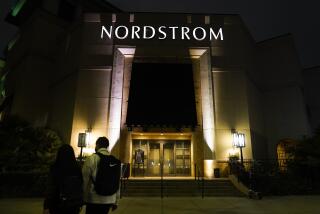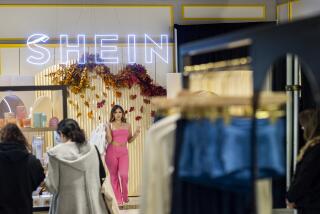Nordstrom ranks as an American shopping favorite, retail survey says
President Trump isn’t about to shop Nordstrom any time soon, yet for many Americans nationwide, the retailer remains their favorite store.
Nordstrom’s popularity is underscored in a just-released retail survey of 10,714 adults in all four U.S. census regions conducted in December by Market Force Information. For the fifth year in a row, Nordstrom ranked as the nation’s favorite fashion retailer in the annual survey, winning on service, ease of shopping, ambience and for being a high-end brand with value, despite recent financial results indicating some challenges at Nordstrom’s full-line doors.
Dillard’s ranked second, being seen as the best for creating a look and enabling customers to find correct sizes. TJ Maxx ranked third and was called out for merchandise selection.
Other retailers ranked high were American Eagle Outfitters, which was noted for its fast checkouts; Ross Stores, which like TJ Maxx scored high for merchandise selection — though there’s been some concerns from consumers about some rising price points, and Ann Taylor, which was seen as doing well in a few categories, including offering value and sales help, while slipping a bit with its merchandise selection.
Lane Bryant’s and Nordstrom’s associates assisted customers most often, while Target and TJ Maxx shoppers received the least help.
“Sales associates are the front-line representatives for retailers, and how they engage with customers can make or break the shopping experience and impact sales,” said Cheryl Flink, chief strategy officer for Market Force Information. “The research shows that 90 percent of customers who were assisted by a sales associate bought something. When customers were not assisted, only 82 percent made a purchase. That 8 percent difference in conversion rate is a key reason why fashion retailers need to invest in their sales staff.”
Market Force found that Nike is consumers’ favorite footwear retailer, followed by Skechers, DSW Shoes, Foot Locker and Aldo, in that order.
Nike ranked first for store atmosphere and the ability to find the correct size. Payless Shoe Source led in value and checkout speed, but faltered in other categories. Foot Locker rated highest for selection and ease of finding product needed.
Market Force is involved in consulting, dispatching mystery shoppers, evaluating service and surveying to help multilocation retailers of various types, including banks and restaurants, figure out how to lower costs and raise revenues at their locations.
The latest survey seems quite relevant in light of the brouhaha between President Trump and Nordstrom. On Feb. 8, Trump lashed out at Nordstrom, saying the retailer treated his daughter Ivanka unfairly after the Seattle-based department store chain decided to drop her collection.
But Nordstrom said the decision to drop the Ivanka Trump line of clothes was based on the collection’s failure to sell up to expectations. Nordstrom also said the decision had nothing to do with Trump’s tough stance on immigration.
Nordstrom Inc. is obviously pro-immigration. The company was founded in 1901, originally as a shoe store in Seattle, by John Nordstrom, an immigrant from Sweden. The company is run by the fourth generation of Nordstroms — copresidents Erik, Pete and Blake, who are brothers.
On Jan. 31, the brothers sent an e-mail to their employees to offer support and resources for those directly impacted by Trump’s executive order on immigration and highlighting their family’s immigrant background, writing, “We currently employ more than 76,000 people who comprise different races, ethnicities and genders. We literally have thousands of employees who are first- and second-generation immigrants. Every one of your unique qualities brings a richness that allows us to better reflect and serve the multicultured communities we’re a part of and ultimately makes us a better company. We are a better place with you here, no doubt about it.”
Trump has a track record of lashing out at companies for different reasons, retailers included. When he unveiled his candidacy in 2015, he made disparaging remarks against Mexicans. Macy’s reacted by dropping his men’s merchandise, sparking a feud. Bloomingdale’s, a division of Macy’s Inc., said Thursday the store has made no changes in its approach to the Ivanka Trump label and continues to sell her shoes and dresses.
Hudson’s Bay Co. continues to sell Ivanka Trump apparel and shoes at its Hudson’s Bay and Lord & Taylor department stores. “We respect our customers’ right to choose the brands that work for them. In turn, our customers’ choices inform our decisions on which merchandise we offer,” the company said.
Despite the rising political and economic uncertainties since Trump was elected, the Market Force survey shows that consumer confidence is high, with 40 percent believing the economy will strengthen in the next year, while 31 percent see it weakening and 28 percent seeing it staying the same.
Seventy percent said their spending on apparel and footwear will be about even to last year; 11 percent plan to spend more.
The survey also showed that brick-and-mortar stores remain relevant: 80 percent said they shopped at one of their favorite stores at least once in the past 90 days, and more than half shopped brick and mortar at least three times in the past 90 days.
Value is “by far” the biggest factor in choosing where to shop, followed by service, atmosphere and the ability to purchase merchandise on a retailer’s web site, according to Market Force.
Market Force found that 39 percent of the respondents own a wearable device, with the highest adoption among those under age 45. Health and fitness is the overwhelming reason for owning one (cited by 78 percent); staying connected to phones and other devices was second, and style was third. The most widely owned wearables are health and fitness trackers; the most coveted are smartwatches. Smart eyewear and jewelry is less popular.
Respondents reported visiting Nordstrom’s, Macy’s and American Eagle’s web sites the most, and making the most online purchases from American Eagle, H&M and Kohl’s.
Three-quarters do not interact with their favorite fashion retailer online, but when they do, Facebook is preferred. Lane Bryant customers tend to be more interactive with the brand.
In the survey, Market Force asked participants to rate their most recent fashion retailer experience, and their likelihood to refer the brand to others. The results were averaged to attain a “composite loyalty score.” Only retailers with at least 100 locations were included. The spectrum of income levels was broad, with 54 percent over $50,000 a year. Respondents’ ages ranged from 18 years old to over 65 years old. About 75 percent were women; 25 percent were men.
ALSO
Nordstrom to drop Ivanka Trump’s clothing and accessories line
Nordstrom denies pro-immigration email is linked to dropping Ivanka Trump’s brand
Trump slams Nordstrom for dropping daughter Ivanka’s clothing and accessories line
More to Read
Inside the business of entertainment
The Wide Shot brings you news, analysis and insights on everything from streaming wars to production — and what it all means for the future.
You may occasionally receive promotional content from the Los Angeles Times.











